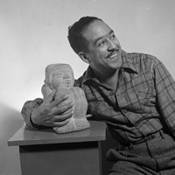
By Gordon Parks - United States Library of Congress's Prints and Photographs division. Public Domain
Langston Hughes
Playwright, Lyricist
Biography
Langston Hughes
James Mercer Langston Hughes was an American poet, social activist, novelist, playwright, and columnist. He grew up with his grandmother following his parents divorce but moved back to live with his mother after his grandmother died. He attended Columbia University, New York to study engineering (his father's idea) but left because of racial prejudice. After a series of jobs, Hughes became a crewman aboard the S.S. Malone and traveled to Europe. He then returned to America and completed a B.A. degree at Lincoln University, Pennsylvania. He returned to New York and lived in Harlem for the rest of his life.
Hughes was one of the earliest innovators of the then-new literary art form called jazz poetry. He is best known as a leader of the Harlem Renaissance and famously wrote about the period that "the negro was in vogue", which was later paraphrased as "when Harlem was in vogue".
First published in The Crisis in 1921, “The Negro Speaks of Rivers,” became Hughes’s signature poem and it featured in his first book of poetry The Weary Blues (1926). Hughes’ life and work were enormously influential during the Harlem Renaissance of the 1920s. He aimed to depict the “low-life”, or the real lives of working-class black citizens, in his writing. He criticized the divisions and prejudices based on skin color he saw within the black community. Hughes was one of the few prominent black writers to champion racial consciousness as a source of inspiration for black artists. Additionally, he had an important technical influence by using folk and jazz rhythms as the basis of his poetry.
Hughes' plays include Mulatto (1935), Mule Bone (1931, with Zora Neale Hurston), Tambourines to Glory (1956), and Black Nativity (1961). He also wrote the lyrics for Kurt Weill's Street Scene (1947).
Shows
Shows associated with Langston Hughes
Monologues
Monologues from shows associated with Langston Hughes
Songs
Songs from shows associated with Langston Hughes
Scenes
Scenes from shows associated with Langston Hughes
Videos
Videos associated with Langston Hughes
Quizzes
Quizzes associated with Langston Hughes
Learning Modules
Learning modules associated with Langston Hughes
Additional Information
N/A